U Penn’s head of smoking treatment says no-hire rule for smokers is ‘regressive’
-

<p>Josette Bates is a security officer with McGinn Security at Philadelphia University. (Bas Slabbers/for NewsWorks)</p>
-

<p>Erica Cody is a security officer with McGinn Security at Philadelphia University. (Bas Slabbers/for NewsWorks)</p>
-
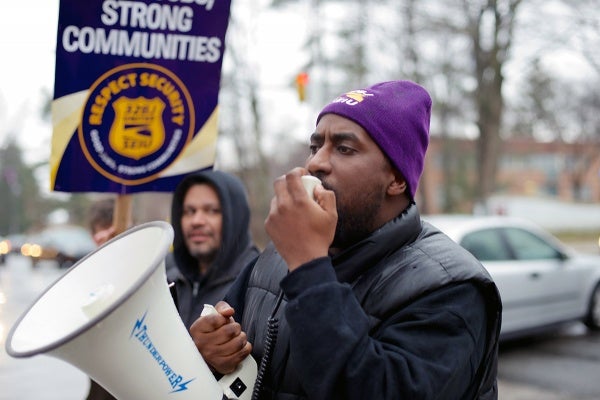
<p>McGinn Security employees rallied for better wages and working conditions at Henry Avenue and School House Lane on Tuesday. (Bas Slabbers/for NewsWorks)</p>
-
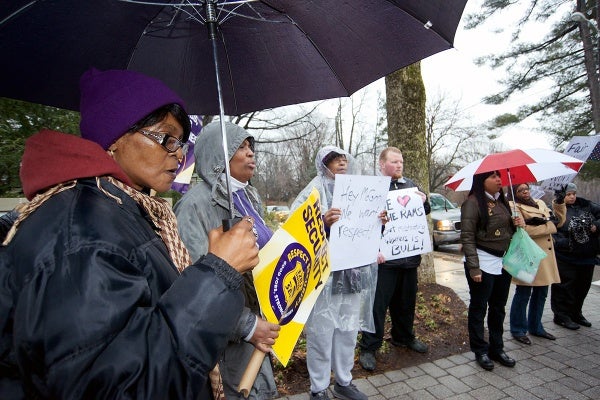
Armed with umbrellas and protests signs a dozen security personal gathered on the corner of Henry Ave and School House Ln. (Bas Slabbers/for NewsWorks)
-
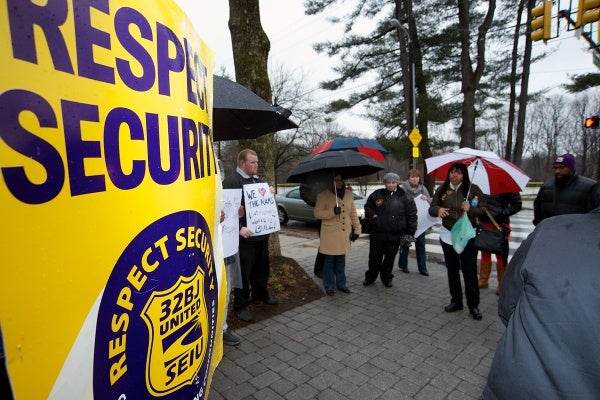
<p>Armed with umbrellas and protest signs, a dozen McGinn Security officers gathered on the corner of Henry Avenue and School House Lane to rally for better wages and working conditions. (Bas Slabbers/for NewsWorks)</p>
-
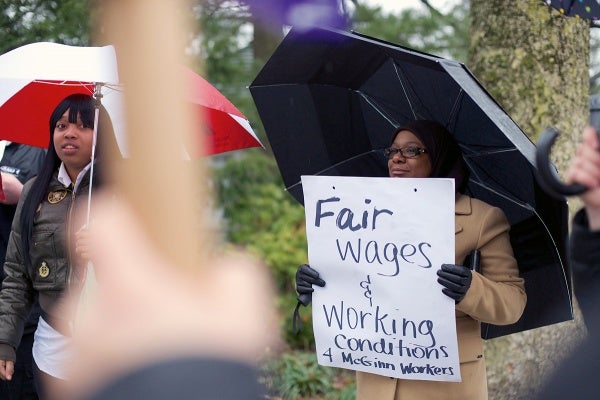
<p>Erica Cody and Josette Bates both work as security officers for McGinn Security. (Bas Slabbers/for NewsWorks)</p>
-
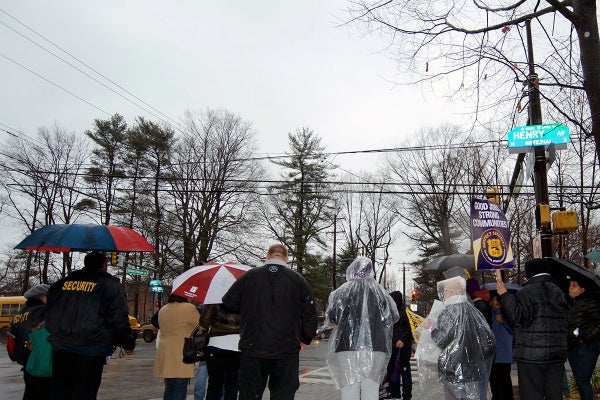
<p>Armed with umbrellas and rally signs, a dozen McGinn Security officers gathered on the corner of Henry Avenue and School House Lane on Tuesday to rally for better wages and working conditions. (Bas Slabbers/for NewsWorks)</p>
-

<p>Hospital tech Maribel Bembischew takes a smoke on her break outside Pennsylvania Hospital. (Kimberly Paynter/WHYY)</p>
-

<p>A hospital employee lights one cigarette off another. Many say they smoke despite health risks to deal with the stress of their jobs. (Kimberly Paynter/WHYY)</p>
-

<p>Scott Furstenau said he started smoking during his first job as an operating room attendant ten years ago. (Kimberly Paynter/WHYY)</p>
-

<p>Andrew Kornrunph works at the hospital coffee shop and takes smoke breaks in the alley across the street. He said that paying higher premiums on his health insurance is fine with him. (Kimberly Paynter/WHYY)</p>
-

<p>Scott Furstenau said that policies like HUP's are discrimination and could lead to similar policies against those who are overweight. (Kimberly Paynter/WHYY)</p>
The head of the University of Pennsylvania’s smoking treatment program said the health system’s new policy not to hire smokers is a bad one.
The clinics and hospitals within the system will no longer hire tobacco users starting July 1 of this year, according to a Penn Medicine careers website. It’s an effort to improve employee health and cut down on healthcare costs. New hires will be required to self-report and will face disciplinary action, up to termination, if they are caught in a lie.
Dr. Frank Leone, director of Penn’s Comprehensive Smoking Treatment Program, doesn’t think it will improve health or cut down on healthcare costs.
“People have dealt with this for a very long time, desperately wanting to quit, unable to quit, confused about why they can’t quit,” Leone said of smokers.
Then, in order to get a job they really need, he said they will have to say they don’t smoke.
“It’s hard to imagine a person doing anything but really just hiding the fact that they’re a smoker,” Leone said. “And once that happens, particularly in a healthcare institution, the chances that they’ll go and seek care for the problem go down considerably in my mind.”
Smokers in hiding will still be employed, but won’t take advantage of employer-offered smoking cessation programs, and healthcare costs will not be impacted, Leone argued.
Federal estimates suggest a smoker costs employers well over $3,000 a year in additional health care costs and lost productivity. But worker advocates have long argued that employers are stepping over the line with policies like Penn’s.
“What you do in your own home on your own time, is none of your boss’s business,” said Lewis Maltby, head of the National Workrights Institute, which has lobbied against similar policies.
“Everything you do in your private life affects your healthcare costs. What you eat. Do you consume alcohol? How do you get around? Do you drive a car or ride a bicycle? And, heaven forbid, you should ride a motorcycle,” Maltby said. “If it’s ok to tell people they can’t smoke in their own home because it impacts company medical costs, there is nothing in your private life that isn’t subject to employer control.”
The Cleveland Clinic was one of the first health systems to stop hiring smokers in 2007. Hospitals in several states followed suit, including many in southeast Pennsylvania: Abington Health, Lancaster General, and Roxborough Memorial — and, last year, central Pennsylvania’s Geisinger Health System.
Geisinger hiring executive Cindy Bagwell said it is too soon to tell if the policy is saving the company money on healthcare costs, but overall, it has had a negligible impact on hiring.
“We’ve had a very, very slight, if any, reduction in our applications. Maybe 1 percent, something like that,” Bagwell said. “In addition, we’ve only had maybe three, four people who have failed the screening.”
A handful of employees on smoke breaks outside of Pennsylvania Hospital Wednesday largely disliked the policy, calling it “discrimination” and saying it would deprive the system of good employees.
UPHS locksmith Martin White, a non-smoker, saw it differently.
“It’s their right whether or not they want to hire smokers; they’re a private company,” White said. “If they feel like they’re incurring extra costs because of it, asking somebody to quit smoking in order to get a job in this day and age, you know, it’s understandable.”
Current employees who smoke will be retained at the University of Pennsylvania Health System, but will pay a higher health insurance premium if they do not enroll in programs to help them quit smoking.
The system said it will continue to provide free smoking cessation counseling and nicotine replacement therapy to staff.
The new Penn restrictions will not apply to employees working in New Jersey. That is one of the 29 states where state law would make such a rule illegal.
A representative of the University of Pennsylvania Health System declined to make someone available for comment for this story.
WHYY is your source for fact-based, in-depth journalism and information. As a nonprofit organization, we rely on financial support from readers like you. Please give today.

